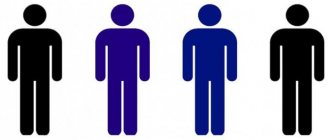Do you often encounter a situation where something is not prohibited, but it is better not to do it? When there are no legal prohibitions, only two restrictions apply: the laws of physics and moral standards.
Today we will discuss the rules and norms of public morality, we will understand what it is and why society needs it. Our “Cognitive Science” and “Self-Knowledge” programs will help you, which will teach you to think and act in such a way as to achieve success using environmentally friendly methods, without violating the rules of morality and legal norms.
So let's get started!
What are moral standards?
Moral norms, also known as moral norms, are the rules of behavior of people in society, stemming from the morality accepted in society at a given moment in time. In turn, morality is the prevailing ideas in society about good and evil, about what is good and what is bad.
In addition, one can come across the definition that morality is the principles, norms and rules of behavior that arise from the ideas accepted in society about good and bad. In this sense, the concepts of “morality” and “moral norms” are sometimes equated.
The element of identity is inherent in the terms themselves. The term “morality” comes from the Latin word moralitas, which is translated as “morality”. It is consonant with the Latin word mores, which translates as “behavior.” Thus, the ancients initially perceived morality and norms of behavior as interrelated manifestations.
In general, this is not far from the truth, because norms and rules of behavior, morality, ethics, conscience are very closely related to each other. Moral norms establish rules of behavior, and following these norms is the moral duty of every person.
This is the fundamental difference between moral rules and legal norms. If a person breaks the law, punishment follows immediately. Well, or when they catch you. The point is that the “crime-punishment” link is prescribed by law. If a person violates moral standards, no one will fine him or put him in prison.
Initially, a violator of moral norms faces inconveniences of a purely psychological nature in the form of public condemnation and reluctance to have common affairs with him. If such a person does not take the path of correction, over time, ignoring morality as a system of norms and rules governing relations between people will end in ignoring the needs of such a person. And, accordingly, real restrictions on freedom of action in the implementation of personal plans and tasks.
Thus, moral norms are rules of behavior for people in society, not fixed by law, but desirable to be followed, because this is in the interests of both the whole society and individuals. In this regard, the question arises: if the norms are not fixed by law and are not formed by an authorized body, but at the same time they must be fulfilled, then who and how forms them? This is a topic for a separate conversation, or maybe even a discussion.
Functions of rules of social behavior
Social norms in society perform three functions:
- Regulation - rules regulate all kinds of behavioral models: they encourage, encourage approved and condemn, limit negative ones (for example, traffic rules: driving into the oncoming lane is prohibited).
- Socialization - help an individual (who is this?) to become a full-fledged member of society, facilitate his “infusion” (example: Petya knows that he should not beat girls, for this he is respected in the class).
- The evaluative function divides actions, from an informal point of view, into good and bad, legal and illegal, and law in the system of social norms indicates their legality or illegality.
How are moral standards formed?
It is believed that norms are established by society and reflect the postulates and values that are relevant to society at a given moment. However, society is not some abstract substance. Society is the people living in it. And this has always been the case, whether in primitive or modern society, in the 17th century or the 21st century, in Europe or Asia.
The transformation of the system of values and moral norms can be traced simply by reading any history textbook and paying attention to the details. Once upon a time, the idea that the Earth was round could get you burned at the stake, and in order to be recognized in society, you had to publicly hold the view that the Earth is flat. Today, the fact that the Earth is round is beyond doubt, but those who believe the Earth is flat will not be burned at the stake. True, they won’t admit you to the Faculty of Geology and Geography either.
Thus, moral standards are gradually transformed as society acquires new knowledge, as this knowledge becomes accessible and self-evident, as the need to fight for food and survival in the literal sense of the word disappears. The concept “gradually” is quite loose.
For the first 300 thousand years since the Middle and Late Paleolithic, little changed among primitive people. Standards of behavior were determined mainly by the need to fight for survival, but signs of a craving for things of a higher order can be seen even then. The very fact that archaeologists have discovered objects that can be classified as monuments of art indicates that ancient people were not alien to thoughts of a more abstract nature than the satisfaction of basic needs.
During Antiquity, things became more fun: the development of shipping and the opportunity to get acquainted with other cultures led to the understanding that different regions may have different ways of life, religions, customs and, as a consequence, moral standards. In turn, this made us think about what moral norms are and what is considered a norm in principle.
The ancient Greek philosopher Pyrrho (360-275) had a very interesting idea for those times that there are no clear reasons to consider some norms correct and some incorrect. What is perceived as unacceptable in one type of society may be the norm for a society with other traditions [R. Bett, 1994]. Now this approach is called tolerance. The term “tolerance” appeared only in the 20th century, but the prerequisites for the formation of tolerance in Europe appeared long before our time.
If in the period of Antiquity the diversity of moral norms discovered in the course of social progress was only a reason for reflection, today the diversity is noticeably wider, and the question “how to relate to the diversity of norms” is purely rhetorical.
More precisely, if a person does not intend to travel beyond the borders of the regional center throughout his life, he (for now) has the opportunity to consider some norms more correct than others. Those who intend to make a career in international corporations do not have such luxury, because multinational and multicultural work teams there have long become a reality.
Moreover, some psychologists believe that today it is difficult to talk about the formation of certain uniform moral norms even within one state due to the fact that society has become more diverse and it is impossible to segment it into workers, peasants and intelligentsia, as was customary in the social sciences of Soviet times. Union.
One example is the opinion of psychologist Alexander Sosland, who believes that today “moral standards are formed spontaneously and change every day. And this is normal for a democratic society. A single source of morality is possible only in a totalitarian society or sect” [M. Senchukova, A. Galperina, 2013]. In his understanding, a sect can be compared to a totalitarian society. More precisely, the sect is “a typical totalitarian society, whose value repertoire is not very rich and has already been exhausted. They sing ideological arias from operas they have read many times and are known to everyone.”
In general, it is difficult to disagree with this, because the moral standards accepted among businessmen may differ markedly from the moral standards among employees of budgetary organizations. And the norms of behavior in big business often differ from those that guide small businesses.
A separate topic is the moral norms of Islam, some of which may seem simply wild to the average European. For example, Islam orders a woman to mourn for 4 months and 10 days in the event of the death of her husband, and during this time not to wear perfume, jewelry, wear bright clothes, or leave the house unless necessary [Islamdag.ru, 2012].
Going to work or to the doctor is considered a necessity, and the widow must spend the night in the house in which she lived with her husband. Thus, almost everything is prohibited, including trips to relatives for several days, trips to theaters and museums, and business trips to other cities.
Here it is time to talk not even about the expediency of such strict restrictions, but about the possibility of their implementation in an era when women, including from Islamic countries, receive higher education, become doctors, pharmacists, managers, economists, lawyers, live in big cities and often quite successful in profession, business and even politics.
Nevertheless, the above-described norms exist, there are many discussions around their interpretation, but not so heated that these norms can be canceled and left in the past. At the same time, certain progress and relaxations are still observed, because once upon a time women of Islam had to observe mourning for a whole year and for this entire year not only not to wear perfume and jewelry, but not even to wash, not to have a haircut or do a manicure [Islamdag.ru, 2012].
In other words, each social group can have its own moral standards, depending on the views, beliefs, and traditions that prevail in it. As correctly noted in the article “Moral values and their role in modern society”, the source of moral norms can be traditions, customs, personal authority of a leader, political or religious, real or mythical [E. Polikanova, 2014].
The formation of moral standards is influenced by the objective material conditions of life and even a person’s personal views. This is a reciprocal process: society influences a person and the formation of his views, and the views and behavior of members of society, all together and each individually, influence the formation of moral standards in a specific historical period. One way or another, moral norms are an expression of the will of certain social groups [E. Polikanova, 2014].
In general, morality is a system of norms and rules that is subject to change. Then is it, in principle, possible for a certain rule, norm, morality, common to all, that would not raise doubts about the correctness or expediency of any people on any continent? Humanity has been struggling with this question for the last many hundreds of years.
Is it possible to have universal moral standards?
Attempts to unify moral standards have been made for a long time. An example of this is such a direction of philosophical thought as moral absolutism. In a nutshell, moral absolutism presupposes the existence of certain absolute moral standards, so they need to be found and strictly followed. And at the same time, he admits that it is not so simple [T. McConnell, 1981].
Moral universalism, also known as moral objectivism, stands in approximately the same position. His main idea is that the creation of universal moral standards is not only completely feasible, but also necessary.
One of the first attempts to implement this idea can be considered the Declaration of the Rights of Man and the Citizen of 1789, which is the greatest achievement of the French Revolution [Assemblée nationale constituante, 1789]. In a more expanded form, this idea is implemented in the norms of the Universal Declaration of Human Rights, which sets out the fundamental rights and freedoms of citizens [UN, 1948]. However, their widespread and unquestioning compliance is still very far away.
We began our conversation with the fact that moral norms are rules of behavior that govern relationships between people, and following them is the moral duty of everyone. However, in order for these norms to be observed everywhere, it is necessary that all people, without exception, consider following them as their moral duty.
Since universal acceptance of the declared norms does not occur, this gives grounds for moral relativism, according to which there are no single absolute concepts of good, evil, morality and morality and all these concepts are relative [A. Kruglov, 2011]. Let us clarify that the word “relativism” goes back to the Latin relativus, which means “relative”.
Moral nihilism has gone even further, which not only does not recognize the existence of single absolute concepts of good and evil, morality and ethics, but even the possibility of subjectively evaluating something as “bad” or “good,” “moral” or “immoral.” From this approach there is only one step to permissiveness, a cultural crisis and problems with the law [V. Porus, 2013].
In this regard, moral nihilism has much in common with moral skepticism, also known as the theory of moral errors (in English, moral error theory). According to this theory, morality, and, consequently, moral norms as such do not exist and cannot exist. Therefore, everything that society considers morality is nothing more than an invention of society itself for its own peace of mind [J. Mackie, 1977].
So how then can we answer the question: is it possible for there to be single universal moral norms? To do this, let’s first try to answer another question: what rules and moral standards do you know? Most likely, there will be no difficulties here. Some will remember “thou shalt not kill,” “thou shalt not steal,” “thou shalt not commit adultery,” and the rest of the 10 Christian commandments; others will speak of the need to observe the principles of justice; and for others, the main norms are politeness and mutual respect. And, of course, almost everyone is ready to quote the famous “act towards others as you would/would like them to act towards you.”
At a minimum, everyone will agree with this in words. Discrepancies begin only when it comes to practice. And it’s not just about such extreme cases as killing an enemy in war. Most officials do not consider receiving a kickback to be theft, although the kickback is included in the estimate and this is the same money that could be used for things useful to society, and not in your pocket. And the commandment “do not commit adultery” will stop from this indecency not every person who has gone on a business trip and is tired of the family routine.
In general, listing the norms and rules of morality and following them are, as they say in Odessa, “two big differences.” If everything is so complicated, do we really need moral standards today?
Why are moral standards needed?
When we defined the concept, we found out that moral norms are the rules of behavior of people in society, not fixed by law, but desirable to be followed, because this is in the interests of both the whole society and individuals. Thus, moral norms arose from the desire or need of society to somehow regulate the behavior of all members of society and relationships within society.
Let's look further and try to answer the question: why, in principle, does society somehow regulate the behavior of all members of society and the relationships within it? Answers such as security, protection from crimes and other crimes are not suitable, because this is already an area of law. Moral norms, unlike legal norms, are not written and certainly not regulated by force.
Consequently, society needs some additional regulation of the behavior and relationships of members of society, which goes beyond the provision of minimal basic needs. Needs that go beyond the basic are precisely what distinguish people from representatives of the animal world. And the presence of moral standards is one of these distinctive features.
Moral norms act as regulators of people's behavior on a par with legal norms and religious norms where the church is not separated from the state. In this regard, the article “Norms of morality, law, religion as regulators of behavior” [E. Toguzaeva, 2007].
Equally interesting is the observation regarding moral standards made in the article “Moral values and their role in modern society” [E. Polikanova, 2014]. The author draws attention to the fact that many moral norms are formulated in the imperative mood: “thou shalt not kill,” “thou shalt not steal,” “thou shalt not commit adultery,” “act towards others as you would like them to act towards you.” "
On the one hand, the imperative mood and indication of desired or undesirable actions look like an imposed norm of behavior. However, when these norms become generally accepted and the majority of people realize their observance as their moral duty, these postulates become moral norms.
Thus, moral norms become a specific form of coordination of human freedom and his needs and the interests and needs of society. And here we come close to considering all the functions that moral norms perform in society.
Functions of moral standards:
- Evaluative - thanks to the existence of moral norms, society has guidelines for how to evaluate certain actions, certain actions of people.
- Regulatory - moral norms regulate the behavior of members of society, encouraging desirable behavior and condemning undesirable behavior. Thus, a balance of interests of all members of society is achieved.
- Educational - moral norms are the basis for the formation of higher order values in society, such as patriotism, dedication, self-sacrifice.
- Controlling - the very fact of the existence of moral norms, their universality and bindingness include mechanisms of control and self-control over their compliance. Even those individuals who for some reason do not share existing moral norms are forced to reckon with them.
- Integrating – moral norms contribute to the achievement of internal harmony among members of society, coordination of actions and beliefs, thoughts and actions, goals and ways to achieve them.
The rules and norms of public morality are one of the most important tools for a person’s adaptation to life in society, the integration of individual freedom and responsibility, individual freedom and social necessity. Moreover, moral norms are primary in the process of human socialization.
Moral standards are instilled in children from a very early age, and children acquire them through implicit learning or learning without awareness of the learning process as a process that has some goals and objectives. So, gradually a person realizes the need to behave in one way or another, to correspond to a certain type of social expectations and, if you like, simply to be cultured, educated and adequate.
Moral standards, as we discussed above, can differ markedly for different historical periods, countries, continents, social groups, but they always have something in common. Moral standards, one way or another, make a person, if not kinder, then more decent. These norms, of course, impose certain prohibitions (“thou shalt not kill,” “thou shalt not steal”), but this simplifies interaction between people.
At the same time, moral norms do not always act as a ready-made set of rules, such as, for example, the 10 Christian commandments. It is rather a beacon or a landmark in the vast ocean of emotions, events, relationships, communications and everything that is inherent in human society. As they say, do no harm to anyone, for evil will return to you. Better do good, because it comes back much less often. This is partly a joke, and partly the willingness to do good and not expect rewards for it is also a sign of moral maturity and the assimilation of moral standards.
I think we have figured out what moral standards are and why society needs them. We remind you that we are waiting for you in our “Cognitive Science” and “Self-Knowledge” programs. And we suggest answering one question on the topic of the article:
We also recommend reading:
- Storytelling
- Cognitive development. Part 2
- Moral: what is it and why is it needed?
- Conformism
- What is social awkwardness and how to get rid of it
- 10 art books for self-development
- Stages of development of ethics in organizations
- Overton Window: Definition, Mechanism, Impact
- Cynicism
- L. Kohlberg's theory of moral development
- Conscience: why doesn’t everyone have it and what to do if it doesn’t?
Key words: 1Cognitive science, 1Self-knowledge
The foundation for building a healthy personality
Spiritual and moral norms and values constitute the image of a person who is perfect in the sense of conforming to the pattern of piety. This is the portrait you should strive for. In this way, the ultimate goals of an action are expressed. An image such as Jesus in Christianity is used as an ideal. He tried to instill justice in human hearts and was a great martyr.
Moral rules and norms play the role of personal life guidelines for a particular person. A personality sets its own goals, in which its positive or negative side is manifested. Most people strive for happiness, freedom, and knowledge of the meaning of life. Moral standards help them regulate their moral behavior, thoughts and feelings.
Morality functions in society as a combination of three structural elements, each of which represents one aspect of morality. These elements are moral activity, moral attitudes and moral consciousness.











